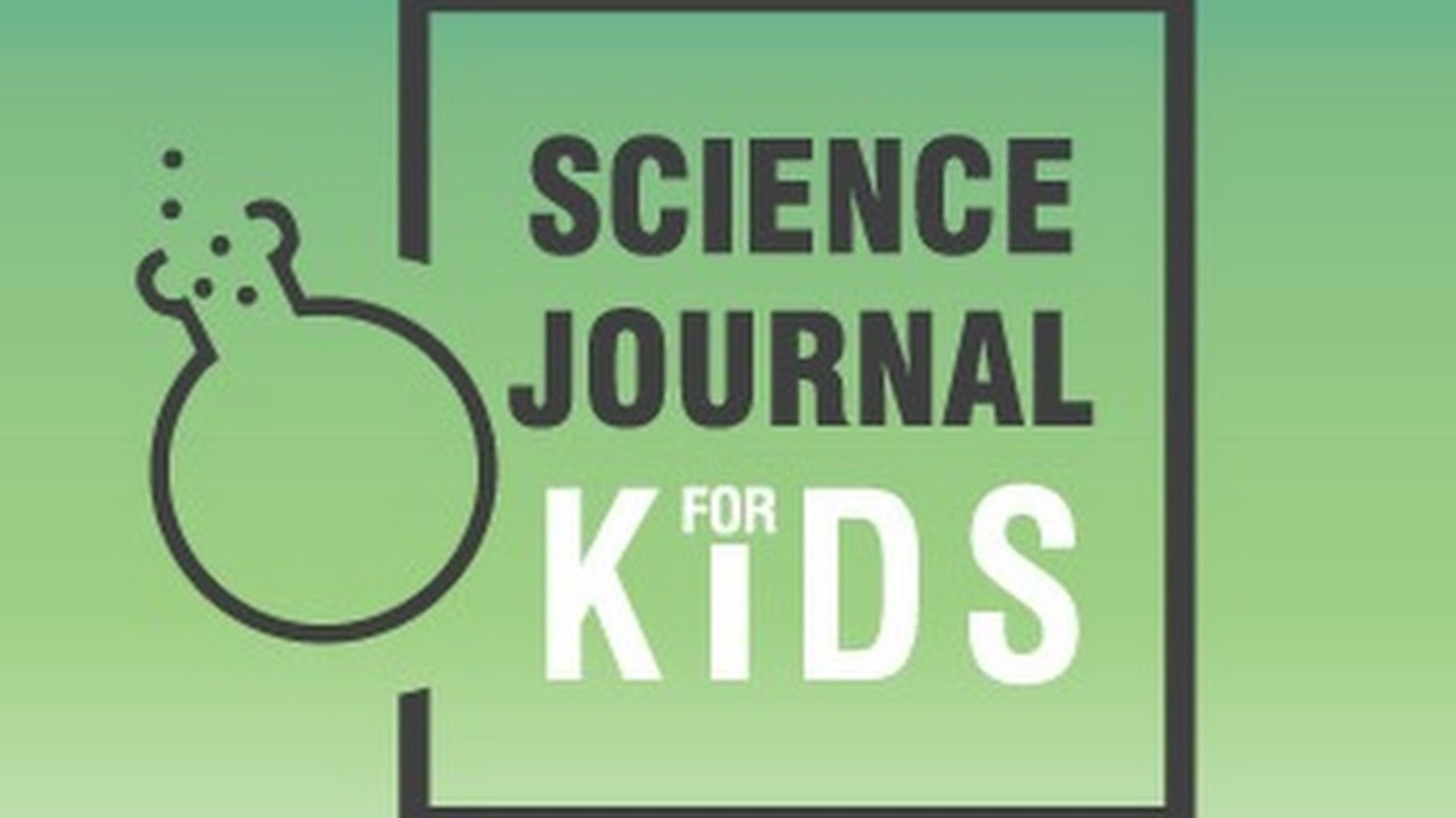Hacking the Sub Lesson: Videos IN Google Forms.
I tend to miss class from time to time. I hate missing class. I love nothing more than being with my 9th grade Biology students and 10th grade Honors Chemistry students helping them to negotiate the complexities, and beautiful intricacies of science. Teaching is my hobby.
Unfortunately, missing class is a reality when trying to juggle being a parent of four young children (two being 3 year-old twin boys), managing a career as an educational consultant, and working online an adjunct profession of education, all while trying to maintain my role as a full-time high school teacher.
I am committed to this. I am sure many of you reading this can empathize. It's just what I'm dong. I'm blessed.
However, missing class means creating sub lesson plans.
I HATE creating sub plans.
I have experimented with many different models: guided reading notes, instructional videos, etc. etc., etc. I want the sub lesson to be meaningful, and not just a lesson that all to often becomes a "study hall."
Unfortunately, none of the above methods seemed to lead to anything other than the typical responses. : "Can we have a study hall?", or "Can we watch a movie?", or "I didn't know we were supposed to do it?"
Tech & Learning Newsletter
Tools and ideas to transform education. Sign up below.
Totally normal, and totally age appropriate. No matter how much I LOVED my teachers in high school, there was always something novel, something surprising, and something fun about having a sub. I get it.
That being said: How can I improve the process? Provide meaning while not being there?
These are simple questions that I'm sure many of you have answers to already, however for me, it has been a significant part of my journey as an educator.
A tangible, grass roots problem that full-time teachers often overlook. How can I be better?
Out of frustration, I sat down a few years ago and wrote down exactly what I wanted a sub lesson to accomplish:
- The lesson must be engaging.
- The lesson must be highly structured.
- The lesson must be efficient.
- The lesson must be simple to complete.
- The lesson must be done individually.
- The lesson must included an accountability structure.
Given that we are a one-to-one school, over the past year there is a method I KEEP COMING BACK to.
A method that ALWAYS seems to work, and checks off each of the boxes above:
Embedding short videos IN a Google Form with associated summary prompts.
Here's my workflow:
- Identify where we are in the content we are learning that week.
- Choose 3 videos from YouTube (< 10 minutes) that relate the content we are learning to a meaningful application, and we would have NOT talked about if I was not absent.
- Insert each video into a Google form, followed by a paragraph text box that includes the following summary prompt: This video was about....Specifically...I really understood....I struggled to understand...I still have questions about....
- Award "points" for completion individually during class.
Here's my logic:
- The video is IN the Google form along with the summary box and Google forms can be access well on any device, PD,C Mac, or mobile. Thus, the extraneous cognitive load of the task is very low. Thus, students can focus
- The videos relate to applications of content we would not normally talk about. Thus, the sub lesson serves to reinforce, and amplify the content we are learning in a novel way.
- The structured summary box prompts students to reflect on the entire video in a systematic way, but also a meta way, while creating a framework that continues to serve to simplify the task.
- By collecting the response in a spreadsheet i am able to quickly review student completion time stamps, as well as survey their responses for questions.
[Google Science Fair as my Biology Final Exam]
Click here for an example of my most recent Google Form sub lesson.
See screenshots of my most recent Google Form sub lesson below:
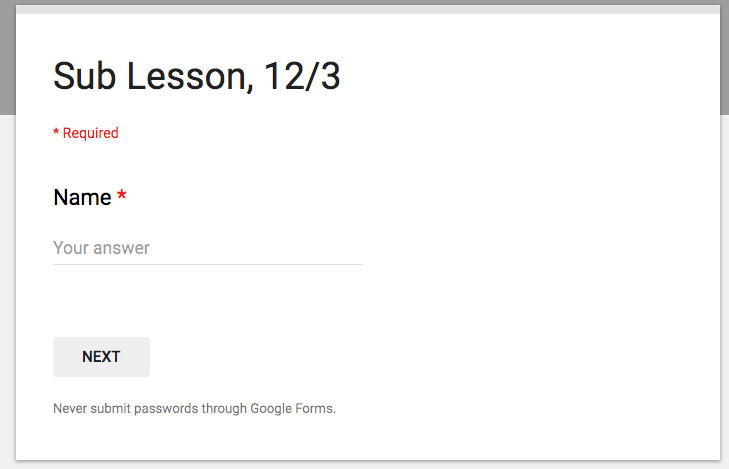
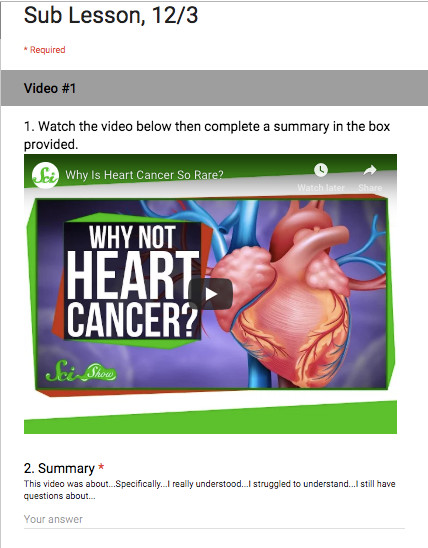
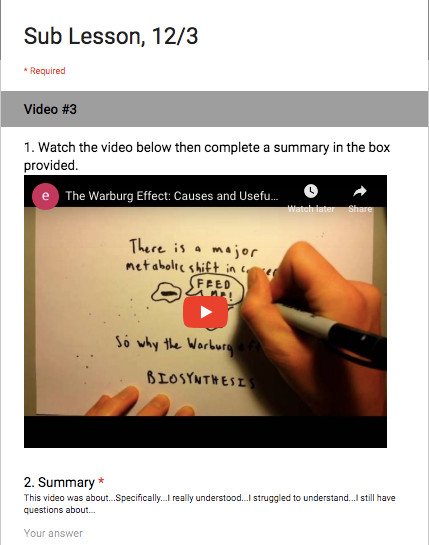
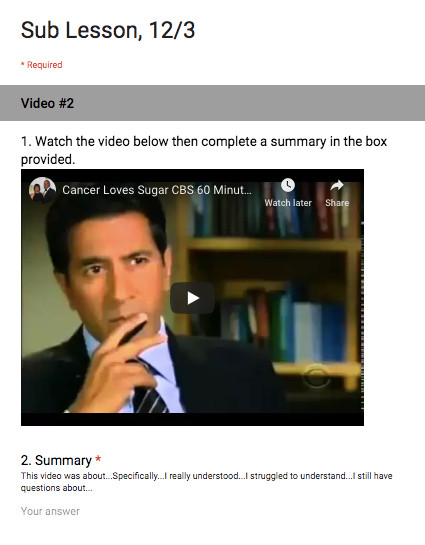
cross posted at www.cyclesoflearning.com
Ramsey Musallam teaches science and robotics at Sonoma Academy in Santa Rosa, California, with the aim of fostering inquiry-based learning environments fueled by student curiosity. He presents widely on sparking student curiosity and teaching with technology. Musallam is a Google Certified Teacher, a YouTube Star Teacher, and a Leading Edge Certified Teacher. Watch his TED talk here and read his blog at www.cyclesoflearning.com.
